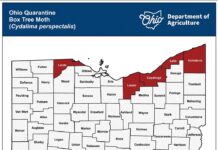So corn is rockin’ north of $7, beans are toyin’ with $14, cattle look to be headed to who-knows-where, wheat prices for almost every variety are tall to really tall, and hogs, well, bacon is sellin’ for what steak used to.
Wow, huh? And here are two more sweet words: land values.
Rising land values
Second quarter 2011 farmland values in the Seventh Federal Reserve District, the buckle of the Midwest’s corn belt that includes all of Iowa and most of Illinois and Indiana, rose an astonishing 17 percent over a year ago.
And, yes, that was the largest year-to-year quarterly rise since the 1970s. What? What did I say?
Oh, the 1970s. Sorry, what do I know?
Probably not much, because 36 percent of the Seventh District’s ag bankers think farmland values will continue to increase while “just 2 percent… expect farmland values to fall in the third quarter of 2011,” noted the Chicago Fed’s August AgLetter.
That’s 18 bulls to every one bear and bankers are rarely wrong, right?
So don’t worry; be happy.
Difficult economy
Besides, scolds like me will do the handwringing over little things that might tarnish the golden harvest of September and October. Little things like, say, jobs because — just guessin’ here — it’s hard to sell $13 ribeyes to people without paychecks.
Even worse (but don’t worry, I’m on the case), the U.S. economy continues to shed well-paying jobs. Indeed, between January 2001 and January 2010, the number of American manufacturing jobs fell 32 percent, from 17.5 million to 11.7 million.
During that same decade, the U.S. trade deficit for manufactured goods, according to Commerce Department data, climbed — ready for this? — an almost perfectly coincidental 30 percent.
Trade deficit
The big winner in that job and money migration was China. It not only got many of those 5.5 million former U.S. factory jobs, our annual trade deficit to the once-Red, now-barely pink nation soared from $84 billion in 2001 to $275 billion in 2011.
The simplest, nearly universal solution to these debilitating trends requires political action: The American government must force a yuan re-evaluation that drains China of its huge — and hugely subsidized — market advantage here.
Such a move, or even talk of such a move, is not good for you, U.S. farm prices, U.S. land values and any Chinese person who happens to eat. But it’s very hard to see any U.S. job push without a similar push for Chinese currency reform and…
Well, let me worry about that for you.
European debt
While I’m at it, let me worry about Europe, too. I know you know that several of the Continent’s national treasuries are under water. For example, Ireland’s national debt to gross domestic product ratio is, whoa, 119 percent and Greece’s is — ooh — 158 percent.
Those bad numbers likely will get worse because the European Union’s economic growth is as sick as ours. Last quarter, U.S. GDP grew 0.3 percent while France’s didn’t grow at all and Germany’s burped upwards a tiny 0.1 percent.
Interestingly, lovely old Belgium, without a government for 17 months, was the Euro-zone winner last quarter as GDP there grew 0.7 percent.
The lesson, cheekily wrote John Lanchester in the Sept. 8 London Review of Books, is that “(F)rom an economic point of view, in the current crisis, no government is better than any government.”
Maybe for Belgium but not so for America, one-fourth the world’s economy. More political stalemate here means more economic trouble both here and in Europe, a quarter of the world economy, also.
Global economy
As such, if one-half of the global economy continues to sputter, how long can $7 corn and 17 percent increases in land values hold?
Relax, beans are headed to $14 and cows to the moon. What could possibly go wrong?
Besides, I got it.
(The Farm and Food File is published weekly in more than 70 newspapers in North America. Contact Alan Guebert at www.farmandfoodfile.com.)
2011 ag comm












